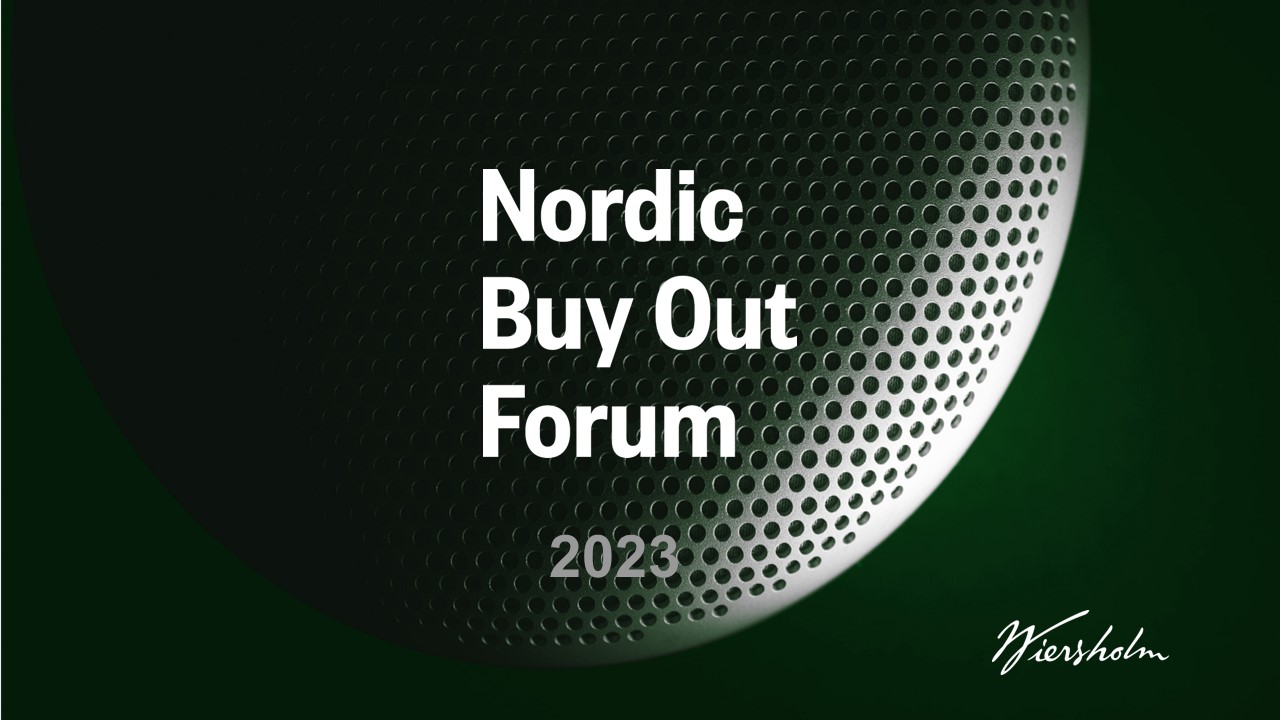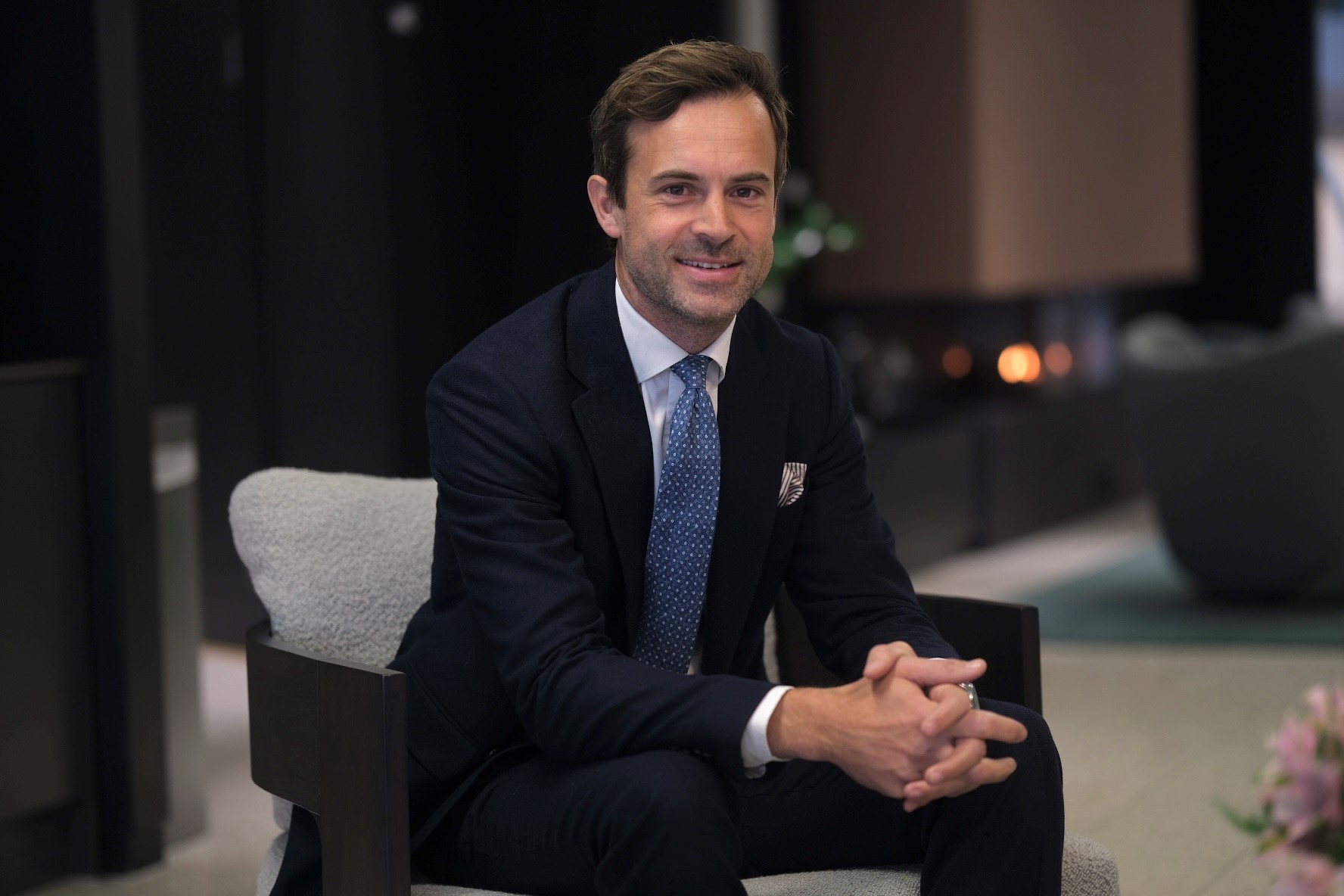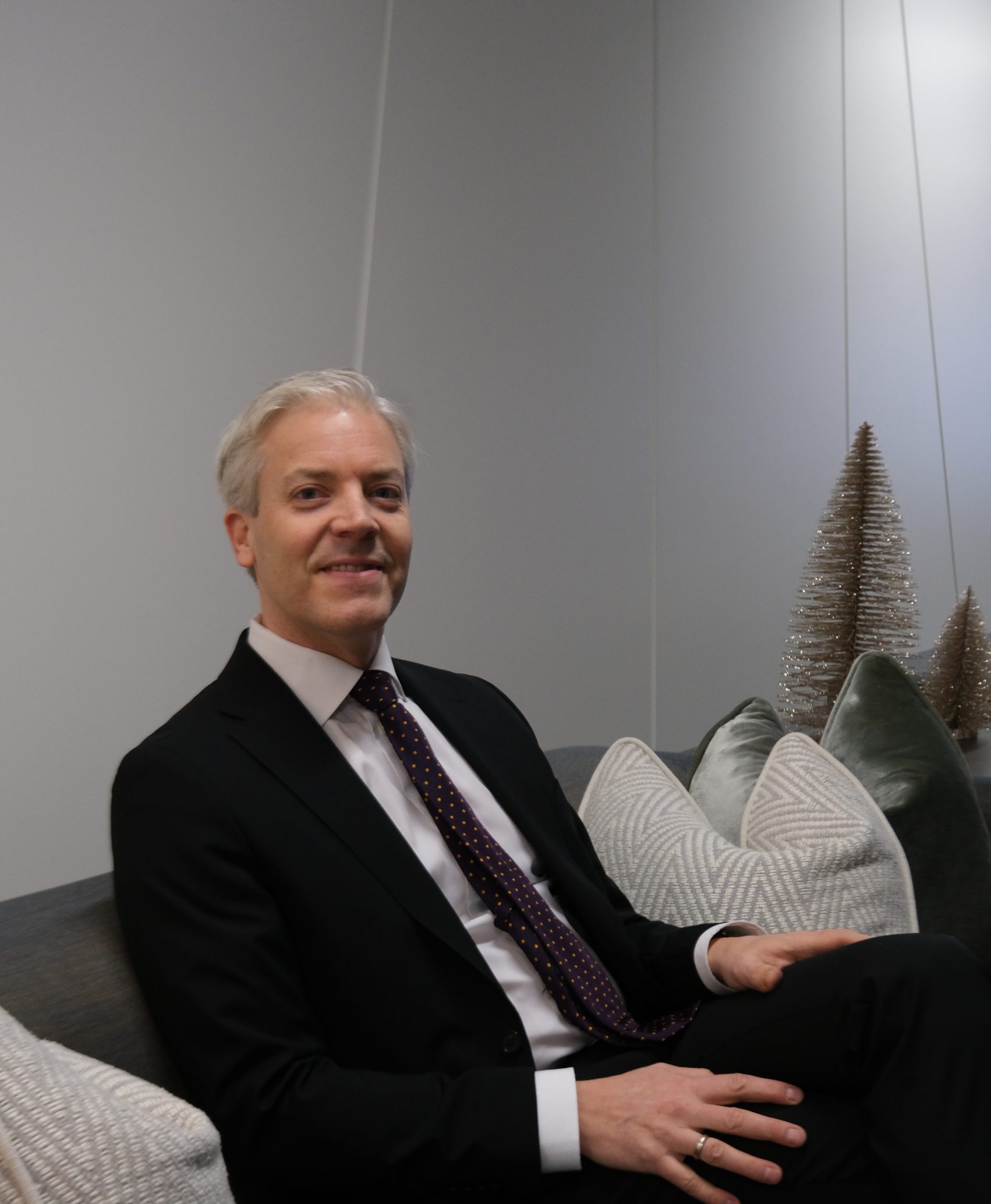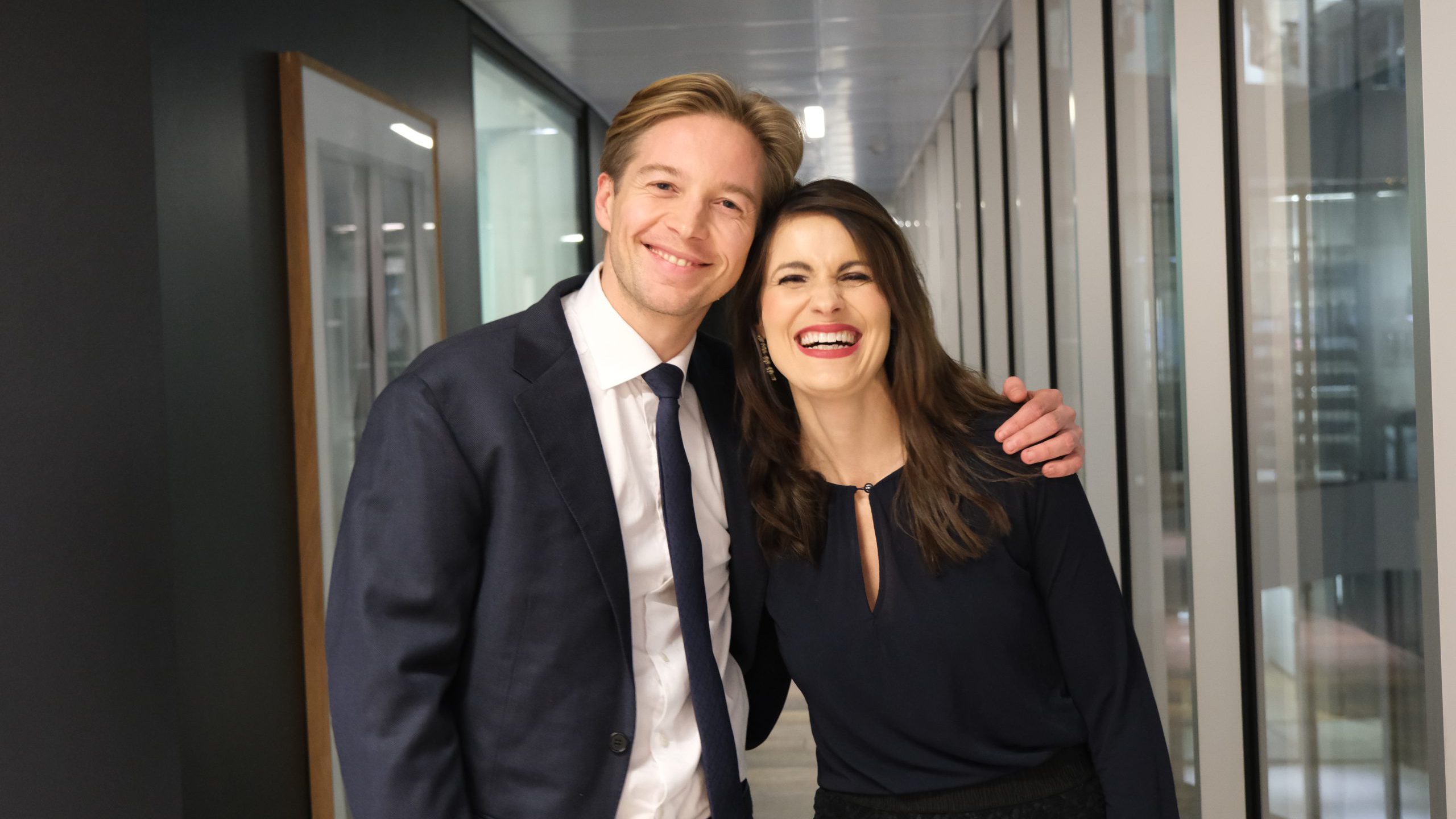Nordic Buy Out Forum 2023 – Highlights

On 7 December, Wiersholm invited the private equity industry and professionals working within M&A in the Nordics to Nordic Buy Out Forum 2023. Nordic Buy Out Forum, now in its thirteenth year, had a record-high number of registrations and attendees from Norway, the Nordics and beyond. As well as a look at recent trends and horizon scanning for the M&A landscape, the main themes and headlines of the forum were ‘ AI – Where Are We Heading? ‘, ‘private Equity and the Challenges in Value Creation Strategy Execution’ and ‘Grow the Pie’.
The key takeaway from the day is that 2023 has been challenging; macroeconomic turbulence with increasing interest rates and inflation leaves global announced M&A volume subdued businesses are exposed to rapid change due to digitalisation transformation and the impact of AI and the tension between superpowers have lead to more protectionism and could also impact global trade, but there are certain positive signs and a cautious optimism for 2024 and 2025.
Part 1 | Market Trends & Outlooks
The conference kicked off with an overview of recent and upcoming trends from Wiersholm partner, Nordic Buy-Out founder and host Jarle Kvam. In the context of the 2023 market slow down, Jarle also drew attention to the regulatory challenges that M&A players are facing due to increased protectionism by way of the FDI and FSR regimes that exist not only within EU and EEA but in many other industrialised countries around the world.
“Norway and the Nordics mirror the global market, experiencing a decline in overall M&A deal volume in 2023 compared to not only the high activity period 2020 and 2021 but also 2022. The trend observed after summer in 2022, with deals slowing down and taking longer to finalise, persisted into 2023 due to rising interest rates, geopolitical instability, and hence investors becoming more risk-averse.
Despite the challenges, the speakers expressed an optimistic outlook for 2024, anticipating increased deal activity due to record-high dry powder in private equity funds and the predictions of falling interest rates in 2024. Numerous industry players are currently fundraising, ready to invest if the right opportunity arises.” says Jarle
Jarle was followed by Ellen Amalie Vold, CEO of the Norwegian Venture Capital Association (NVCA), a long-time supporter of the Nordic Buy Out Forum. Vold provided statistics and trends from both fund raisings, M&A activities and diversity metrics in PE and VCs in Norway. Vold summarised 2023 as “challenging” but had a more optimistic tone on her 2024 prediction: Based on a recent survey amongst NVCA members, there is NOK 10 billion in dry powder.
Klas Eklund, renowned macro economist who worked with SEB for more than 20 years, now with Mannheimer Swartling, elaborated on Jarle’s and Ellen Amalie’s predictions, market trends and outlooks. According to Eklund, the global growth rate now appears to have lowered from 5% to around 3%, and although interest rates will likely stabilise, we should not expect them to come down to the levels we have seen for the last couple of decades: “Money should cost” he stated. Eklund ended his speech on a relatively positive note looking at the opportunities the new surroundings can bring. He ended his lecture with the words: “It is a new world, which means new challenges, but also great opportunities!”.
The third speaker under the headline Market Trends & Outlooks was Henrik Bjerregaard, Managing Director of the M&A (EMEA) team of Deutsche Bank, London. Bjerregaard pointed to the fact that this more challenging deal environment means that there is a lot more time spent on structuring, different capital and deal structures, and other creative solutions, while deals often end up in the plain vanilla area. Bjerregaard also pointed out the fact that there are more aggressive structures and that he thought 2024 would be an active year for M&A.
Part 2 | AI – Where Are We Heading?
Part 2 of the conference featured presentations from:
- Andrew Ang, BlackRock
ChatG(PE) and ChatGP(E): AI and Machine Learning for Private Equity and ESG - Alexandra Lutz, EQT
EQT’s Journey: Building an AI-Literate Investment Organisation
Key takeaways included:
ChatG(PE) and ChaGP(E): AI and Machine Learning for Private Equity and ESG // Andrew Ang, BlackRock
Andrew Ang from BlackRock gave the first of two eye-opening “AI speeches”. Andrew Ang works with factor investing and gave specific use cases/examples of how BlackRock uses AI and machine learning to find prospective investments, due diligence and create short lists on investment cases for BlackRock. Ang highlighted that AI opens up entirely new possibilities for the players within the industry by using tools to systematise and analyse large amounts of data, providing several practical and specific examples of how BlackRock applies AI. Amongst other things, Ang cited BlackRock’s use of AI to predict the most plausible outcomes for specific markets and companies, demonstrating the tangible benefits of AI in the field of private equity.
Looking ahead, Ang shared BlackRock’s prediction that AI will play a significant role and serve as an invaluable tool for deal teams within Private Equity firms. He also emphasised that everyone will use AI somehow, but investment professionals will always need a human in the loop.
EQT’s Journey: Building an AI-Literate Investment Organization // Alexandra Lutz, EQT
Alexandra Lutz from EQT’s Motherbrain shared insight on EQT’s AI journey and their mission of building the most AI literate investment organisation in the world, accelerating every part of the EQT platform with strategic Data and AI. With an AI vision clearly stating that companies with algorithms will outcompete companies without algorithms, EQT uses AI within their investment teams to systemise data (focusing on in-house information sourcing), and to refine and optimise the road to the final investment decision. Lutz emphasised the importance of automating some of the grunt work, while, in a more optimistic view than Ang, leaving the final judgement of what assets to acquire to humans.
Part 3 | Private Equity and the Challenges in Value Creation Strategy Execution
Part 3 presentations were from:
- Hugo Maurstad, Monte Rosa Capital
Value Creation in Turbulent Times - Rolf Torsøe, Nordic Capital
Tech Investing in the New Normal - Martin Schütt, Askeladden & Co
Building Companies in a Perfect Storm
Key takeaways included:
Value Creation in Turbulent Times // Hugo Maurstad, Monte Rosa Capital
Hugo Maurstad from Monte Rosa Capital shared his perspectives on value creation in turbulent times. He highlighted that the profitability of the Private Equity sector over the past 20 years has primarily been driven by low interest rates, which have consistently driven up deal values. As several speakers before him, Maurstad was also optimistic for 2024, and pointed out that moving forward, firms are specialising more and more, which helps to navigate a more challenging environment. Monte Rosa intends to distinguish itself by making truly exceptional investments to ensure good returns. Maurstad emphasised that players can no longer rely on a general growth in multiples alone.
Despite the challenges the industry faces in these turbulent times, Maurstad and Monte Rosa Capital remain positive about the private equity industry going forward. He is of the view that Private Equity is a clearly superior ownership model, as it attracts better talent, has quicker access to financing, more quickly are able to implement necessary changes and has to deal with fewer regulatory (disclosure) formalities, compared to public companies.
Tech Investing in the New Normal // Rolf Torsøe, Nordic Capital
Rolf Torsøe of Nordic Capital highlighted the significant shifts in the tech investment landscape, caused by fundamental changes such as the pandemic and geopolitical tensions. The pandemic triggered a boom-and-bust cycle, with investment deals continuing in its wake, albeit in a more selective manner. The bedrock principles of tech investing have changed, with acquisition costs witnessing a substantial rise.
Torsøe emphasised that investors are now, due to a decrease in M&A activity since its peak in 2021, adopting a more selective approach in these uncertain times, preferring companies possessing the resilience necessary to withstand challenging periods. Fund managers are under pressure to deliver returns to investors, leading to cautious but selective investment strategies. Torsøe also highlighted the expectation of a bounce-back in investment activity, driven by the high amount of dry powder that needs to be deployed. Torsøe concluded by emphasising the increasing specialisation of funds, with AI emerging as a key driver of value creation. In this new normal, the secret to successful investing, as Torsøe eloquently put it, lies in acquiring “wonderful businesses at fair prices” – people still pay good money for good businesses.
Building Companies in a Perfect Storm // Martin Schütt, Askeladden & Co
Martin Schütt gave an energetic speech on the challenges and opportunities that exist in the current investment landscape. Schütt also spoke of the significant downturn in funding for early-stage companies in 2022 and 2023, including Askeladden’s companies, only to shift the focus to how challenges often give rise to unique opportunities, based on, amongst other things, optimism in the entrepreneurial space, positivity from politicians, the EU, etc. resulting in the “picture not being that bad”.
Setting aside the years 2021 and 2022, Schütt contended that the funding situation, while challenging, is not as negative as it appears. He highlighted the beneficial role of governmental financial support, such as Innovasjon Norge, and the extensive amount of grants available.
Schütt stressed the importance on keeping focus on profitability, with no room for inefficiencies. He shared an experience of increasing prices with no effect on volume, suggesting companies should dare to increase prices. He ended his speech with a quote on doing the grunt work to get the highs that very few in the audience are likely to forget…
Part 4 | Grow the Pie
Part 4 presentations were from:
- Alex Edmans, London Business School
How Great Companies Deliver Both Purpose and Profit - Kai Jordahl, Longship
Beyond Compliance – ESG for Long-Term Value Creation - Karsten Kreiling and Elisabeth Lian Haugsdal, Wiersholm
The Changing Regulatory Landscape for M&A - Reidun Tysseland and Johan Nord, Cubera
What Is a Continuation Vehicle Transaction and Why Does It Matter?
Key takeaways included:
How Great Companies Deliver Both Purpose and Profit // Alex Edmans, London Business School
Professor of Finance and TED/TEDx speaker Alex Edmans focused on the interplay between purpose and profit. Edmans argued that purpose can enhance long-term profits, using Vodafone’s creation of M-Pesa as an example. He suggested that companies should aim to do more than just avoid harm; they should actively do good, even if there is no immediate expectation to do so. He explained that the essence of ‘growing the pie’ is about more than just splitting the pie equally. Purpose is about growing the pie through innovation, execution, and new ideas, thereby creating value for society.
Edmans highlighted the importance of evidence and avoiding confirmation bias when determining what creates long-term value. He suggested that purpose is the answer, but it’s important to define what purpose means. Purpose of a company, according to Edmans, is about understanding why a company exists, who it serves, and what is our role. This purpose must be specific and cannot encompass everything; it should focus on a few key areas.
Edmans left everyone in the room reflecting on their purpose: why do we exist, why do we serve and what is our role.
Beyond Compliance – ESG for Long-Term Value Creation // Kai Jordahl, Longship
Kai Jordahl from Longship delivered an insightful speech on the importance of going beyond compliance for ESG to create long-term value. Longship’s investment strategy is inspired by Edman’s and Jordahl thus showed how purpose plays an important part in Longship’s investments and portfolio companies. He emphasised that mere excellence in ESG compliance will not suffice. The focus should extend beyond “ticking boxes” to making a substantial impact on society and on other stakeholders.
Jordahl concluded his presentation by stressing the need for authenticity in ESG. ESG should be more than just storytelling, and the private equity firms have to focus on what truly matters, creating a real impact for the stakeholders. He asserted that ESG should be a tangible and significant part of the investment strategy for every private equity firm.
The Changing Regulatory Landscape for M&A // Karsten Kreiling and Elisabeth Lian Haugsdal, Wiersholm
Wiersholm’s competition partner Elisabeth Lian Haugsdal and newly announced M&A partner Karsten Kreiling gave an introduction to the changing regulatory landscape for M&A and how that is expected to impact deals going forward. They focused on foreign subsidies regulation (FSR) and foreign direct investment (FDI) rules as key examples and noted that these regulatory changes could lead to decreasing deal certainty. The stand-still obligation for FSR and many FDIs, coupled with the lack of clear deadlines, could further trap bidders in lengthy and costly processes.
In terms of solutions, continuous monitoring of FDI and FSR, especially for entities regularly involved in M&A, was suggested. Emphasis was put on the importance of thorough and early-phase regulatory due diligence. Sellers should consider the regulatory risk for each buyer, and buyers should present sound assessments and solutions for identified risks. Creative closing structures, such as carve-outs of problematic parts and closing in instalments, were also suggested.
What Is a Continuation Vehicle Transaction and Why Does It Matter? // Reidun Tysseland and Johan Nord, Cubera
Reidun Tysseland and Johan Nord from Cubera discussed continuation vehicle transactions and why they matter. They highlighted that these transactions enable liquidity and allow GPs to continue owning their best assets for longer. For GPs, these transactions offer several benefits, including as mentioned liquidity, but also alternative exit routes, and the opportunity to earn management fees and carried interest.
Currently, several Nordic GPs are considering GP-led processes, with 5-7 processes ongoing and a deal volume well in excess of 1 billion euros. In terms of pricing, these transactions typically see a 1-9% discount. The success of a GP-led transaction depends on several factors. The quality, robustness, and valuation of the asset itself are crucial. The reason for the transaction and alignment with the GP are also important, with transactions often based on less information compared to a full M&A process.
Looking ahead, Cubera predicted that GP-led transactions would significantly outpace IPOs in the future.
Closing Remarks // Jarle Kvam, Wiersholm
See you next year on 5 December 2024. Save the date!
Published:
Last modified:






